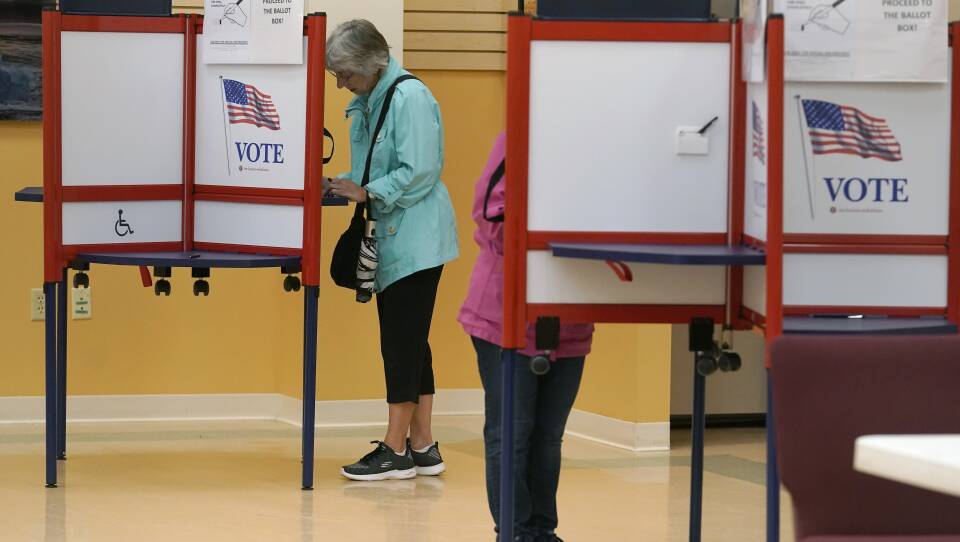The Nov. 8 election is still weeks away, but for large swaths of Massachusetts, the window to pick lawmakers to represent them for the next two years on Beacon Hill is already closed, if it existed at all.
Millions of residents will be greeted by just one name on the general election ballot for their House or Senate district, or both. That's because nearly two-thirds of the races for state Legislature are uncontested in November’s election: 109 of 160 state House districts, and 18 of 40 Senate districts. That group includes both incumbents who faced no formal challenge this cycle and candidates with no further contests after prevailing in the Sept. 6 primary.
The dearth of general-election challengers benefits some newcomers who will bring more diverse backgrounds to Beacon Hill — including what will be an all-Latino delegation representing the majority Latino city of Lawrence — but more than half of the Legislature’s open seats are held by incumbents who will cruise to reelection without even having to campaign. That lack of competition has become a pattern in Massachusetts, which political analysists and activists say keeps power in the hands of those who already have it.
"You have the vast majority of legislators knowing for sure that they're going to be reelected," said Erin Leahy, the executive director of Act on Mass, a progressive group that advocates for rules reform in the Legislature. "They're going to sail to reelection without having to even run another campaign, and that brings about a really problematic dynamic where reps and senators aren't really accountable to their constituents. In theory, a healthy, representative democracy means voters have a choice in who represents them."
"In theory, a healthy representative democracy means voters have a choice in who represents them."Erin Leahy, executive director of Act on Mass
Between the House and the Senate, a total of 102 sitting lawmakers faced neither a primary nor general election opponent this year — including top legislative leaders House Speaker Ron Mariano and Senate President Karen Spilka.
Democrats hold a supermajority in the state Legislature, and also account for the vast majority of the uncontested seats this November: 86 in the House and 15 in the Senate. Fourteen House Republicans and one Republican senator, Sutton Sen. Ryan Fattman, are similarly unopposed.
Mariano leads a 125-member Democratic caucus in the House, a powerful post atop a veto-proof majority that gives him little incentive to encourage more general-election competition.
As for the lack of primary challenges to House Democrats, Mariano campaign spokesman Scott Ferson pointed to the current combative political atmosphere as one factor that makes it hard for people to run for office and said he believes Mariano is "concentrated on the things he can control," like expanding access to voting.
Ferson said Mariano is proud of the House's work this session on voting reforms and redistricting, a process that "resulted in a number of pretty exciting new candidates, diverse candidates, that we're confident are going to be joining the House."
While the low rate of electoral turnover can slow the pace of representation in the predominantly white and male Massachusetts Legislature, several Democratic primary winners on track to become lawmakers without further competition are people of color and women. Of those nine candidates, only one, Methuen's Ryan Hamilton, is a white man.
In the House, a pair of newly drawn majority-minority districts were claimed by women born in Brazil: Rita Mendes in Brockton and Priscila Sousa in Framingham. Rep. Liz Miranda, who prevailed in a five-way primary, is set to become the fourth Black woman ever elected to the Massachusetts Senate, where she’ll represent a Boston district that carries significance for communities of color across the state. Two other women, Jennifer Armini of Marblehead and Adrianne Ramos of North Andover, are also set to join the House next year without any general-election competition.
Lawrence, the city that counts the highest concentration of Latino residents anywhere in Massachusetts, is poised to have an all-Latino delegation in the new term with a trio of new lawmakers set to join incumbent Rep. Frank Moran. City Councilor Pavel Payano effectively clinched an open majority-minority Senate district, and another councilor, Estela Reyes, won the primary for a House district with a mostly Hispanic population. Methuen's Francisco Paulino was the only primary challenger to topple an incumbent — Lawrence Rep. Marcos Devers — this year, and is on track to hold that seat in the new term.
In addition to the Lawrence candidates, the group Amplify Latinx heralded the primary wins of newcomers Manny Cruz of Salem and Sam Montaño of Boston, who each face no further opponents on their path to the House. Montaño would be the first nonbinary person elected to the Massachusetts Legislature, according to the progressive organization Run for Something, which backed their candidacy.
Most of the nine Democratic primary winners on track to join the Legislature — all but Paulino — are seeking open seats, with no incumbent lawmaker in the race. The dynamic is different in the many other uncontested races this fall, where incumbents are now on a glide path to reelection without opponents who could pressure them into clearly defining their positions or defending past votes to constituents.
The lack of electoral competition is an established pattern in Massachusetts. Two years ago, 125 incumbent lawmakers drew no official, major-party challengers. That year, Massachusetts earned the lowest score in the website Ballotpedia’s annual legislative competitiveness rankings. One statistic that contributed to the dubious distinction was lack of major-party competition: Democrats ran for 141 of 200 legislative seats without Republican competition, and Republicans ran for 20 seats without Democratic competition.
A 2019 report from the think tank MassINC found that in 2018, "a year many hailed as one of greater popular engagement in electoral politics," only one-third of the state's legislative seats were contested in the general election, and fewer than half were contested in either the general or primary.
The people who benefit from the current system are the ones who have the power to change it, and to do so they'd have to put some of their power or access on the line, said Steve Koczela, president of The MassINC Polling Group.
Incumbents are able to build up massive campaign accounts by fundraising even when they're not running, and their names are listed first on the ballot, which Koczela said can offer a couple points of advantage in lower-information contests like legislative races. Some donors and endorsing organizations also make it a practice to support incumbents, another barrier for challengers.
"Our political system is set up as a reelection machine," Koczela said. "The rules are set up that way, the customs are set up that way, and it works."








